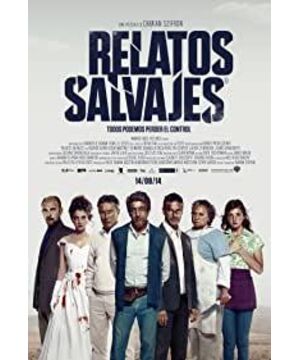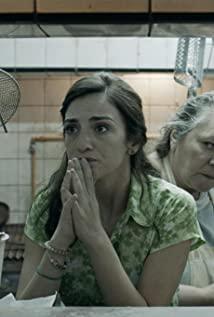The presentation of six independent stories, including the exposure of human nature, the criticism of the government, and the satire of reality, made me feel surrounded by a strong sense of absurdity when watching the film. This is deeply rooted in people's hearts, the inherent absurdity of society, and what the six segments express is to make it concrete. The music, character creation, and plot rhythm of the film itself are well controlled. Expressing profound thoughts with superb technique, this film is a masterpiece. In the first story, you can see an interesting portrayal of characters and the development of the plot. The brief communication between several people on the plane presents the image of a "male protagonist" who has psychological problems and has been despised by people around him since he was a child. Just as his psychiatrist said, "After a few more conversations, he will never look for me again", the "male protagonist" in the film is also so autistic that he doesn't want to see the audience, and directly leads the plane to a couple. Older children (maybe the parents who are the source of his psychological problems). How much negative impact can we have on someone else if we say something bad to someone else? No one can answer this, but the "male protagonist" tells you that you can't get rid of it. He doesn't care that "it's all because of your parents, a whole plane of people has no ability to change all this", he just wants to drag the absurd little world around him to bury his absurd life, and this behavior itself is absurd enough. Are the people on the plane guilty or innocent? Perhaps there is no such binary opposition in the essence of the absurd. This reminds me of Mr. Lu Xun's words "The endless distance, countless people, are all related to me". The second story Aunt Chef kills the politician to avenge the waitress. This passage makes people think about whether the waitress's hesitation is behind her kindness or her servility. The waitress didn't even have the slightest idea of resistance when facing the enemy who destroyed her family, while the chef directly said that breaking common sense is something everyone wants to do, and even stated that "in prison is more free than outside". I think this is a symbol of challenging the order and a satire of reality. And those who challenge the order in the end face the judgment of the old order. The plot of the third story is very compact and exciting, and the environment setting is also close to the real "savage". This has also contributed to the fact that both parties in the conflict have repeatedly ignored the constraints of "civilization" and "killed" again and again to intensify the conflict. Maybe this is a lose-lose ending caused by the evil of human nature exposed after entering the barbaric land, but what I saw was a dark humorous story full of absurdity after breaking away from the mask of civilization. Does the emphasis on good and evil in the civilized world still make sense when human nature is fully exposed in the primitive? Civilization is a good barrier, hiding the absurd while restraining our behavior from becoming tightly hugged corpses. But we must not turn a blind eye to the absurd thinking and understanding. The plot of the blasting engineer is not difficult to guess, and it is worth mentioning the description of the engineer in prison. In real life, an engineer who has never had a smile in his family, friends, or society, laughs so happily with everyone in prison. This is simply what Chef Aunty said in the second story, "Prison is more free than outside. ". The extreme anti-social has received the support of the whole society, which is extremely ironic. The law is one of the powerful means by which civilization restrains our behavior, but when some clauses are not reasonable enough, and even become a means of profit-making, just like a crack in the mask, the sense of absurdity beneath it arises spontaneously. The engineer's choice is to defy the absurd with extreme behavior and mend the cracks. He succeeded, and his success exposed the absurd nature of the world. This clip's satire on government functions is also a highlight, but it doesn't make much sense without living in an Argentine social environment. The fifth story The rich man agreed to a snowballing increase in the asking price, and finally refused to negotiate completely because it increased by another $30,000, and even encouraged his son to turn himself in. Was it the greed of the other three breaking through his mental defenses or was it just his means of negotiating? Perhaps a combination of both, and in the end he reached a satisfactory price, with the gardener taking the blame for his son. If this ends, then this is a satirical story of capital society and human greed. But the gardener was hacked to death by the victim's husband as soon as he stepped out of the estate gate. This is quite unexpected and reasonable. The man who was hacked to death should have wanted to bear his wrong son, but in the end the gardener died by accident. It can be said that this is an absurd picture after successive destruction of the law. Who should usher in the doomed death, this is the question left by this story. The last story When the bride scolded the groom on the rooftop, I thought of the dialogue at the end of "Gone Lover" "We torture each other and control each other, what's the point of this?" "This is marriage." As a result, the bride and groom are also like Like "Gone Lover", they held hands again after a lot of riots, combining a marriage of love and killing. How similar their final wild union at the cake table is to the scene in the third story where the two road rage men hug each other and get burned to death. The extreme contradictions of the bride and groom push the plot to a climax, and also push the absurdity of the whole film to a higher level. After watching the film, it is easy to think of one word, out of control. What is the difference between controllable and out of control? The controllable order represented by civilization is often vulnerable, and no one or something is out of control for any reason, but once the mask is taken off, the inherent absurdity of the world will lead him into a state of being out of control. Camus advocates people to struggle and struggle in the absurd. In the film we see some people who choose to die with the absurd; some people live with the absurd; Extreme behavior is exchanged for the solidarity of the society; some people try to challenge the order with capital, but get a wrong outcome; some people completely let their natures go in a disorderly barbarism, and both perish. This is the absurd appearance of beings. We don't have to look at these stories from a moral or any humanistic standpoint, because the title has already told us: This is a barbaric story that takes place in the animal world. Absurd, no evaluation needed. After watching the film, it is easy to think of one word, out of control. What is the difference between controllable and out of control? The controllable order represented by civilization is often vulnerable, and no one or something is out of control for any reason, but once the mask is taken off, the inherent absurdity of the world will lead him into a state of being out of control. Camus advocates people to struggle and struggle in the absurd. In the film we see some people who choose to die with the absurd; some people live with the absurd; Extreme behavior is exchanged for the solidarity of the society; some people try to challenge the order with capital, but get a wrong outcome; some people completely let their natures go in a disorderly barbarism, and both perish. This is the absurd appearance of beings. We don't have to look at these stories from a moral or any humanistic standpoint, because the title has already told us: This is a barbaric story that takes place in the animal world. Absurd, no evaluation needed. After watching the film, it is easy to think of one word, out of control. What is the difference between controllable and out of control? The controllable order represented by civilization is often vulnerable, and no one or something is out of control for any reason, but once the mask is taken off, the inherent absurdity of the world will lead him into a state of being out of control. Camus advocates people to struggle and struggle in the absurd. In the film we see some people who choose to die with the absurd; some people live with the absurd; Extreme behavior is exchanged for the solidarity of the society; some people try to challenge the order with capital, but get a wrong outcome; some people completely let their natures go in a disorderly barbarism, and both perish. This is the absurd appearance of beings. We don't have to look at these stories from a moral or any humanistic standpoint, because the title has already told us: This is a barbaric story that takes place in the animal world. Absurd, no evaluation needed.
View more about Wild Tales reviews










